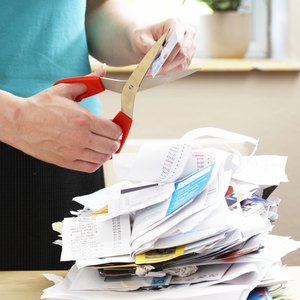
Chances are you will be offered a receipt whenever you make a purchase or pay a bill with a credit card, whether online or in a store. These receipts may bear your name and a portion of your credit card number -- usually the last four digits. Although you may want to keep receipts until you get your credit card statement for verification purposes, you should dispose of them properly when they're no longer useful rather than tossing them in the garbage can.
Merchant Requirements
Merchants are required to protect consumer information on credit card slips. The Fair and Accurate Credit Transactions Act, or FACTA, seeks to prevent identity theft by limiting the amount of data printed on a credit or debit card receipt. No more than the last five digits of the card can be shown, though most show only four digits, and no card expiration dates are allowed on printed receipts. In addition, FACTA requires businesses to properly dispose of documents that contain consumer information. Receipts should be destroyed to the point that they cannot be reconstructed or reread.
Consumer Considerations
When you are thinking of storing credit card receipts, determine how long you should keep sensitive documents. Other than taking up space, they put you at risk of identity theft. As a general rule, hold onto credit card receipt records related to your taxes, such as business expenses. Keep those you may need as proof of purchase or bill payment, such as mortgage payments, home improvement expenses, car loans and other major purchases for as long as they are needed.
Hard Copy Receipts
Criminals can easily pick through your recycling basket or garbage for credit card information, which is why you should use a paper shredder -- especially the type that shreds paper into confetti -- to render them impossible to read or put back together. Place the shredded credit card receipts in a garbage bag and dispose of them normally. You can also use a pair of scissors to cut up areas that display card numbers, although this takes time. Burning or pulverizing the documents will also help make them impossible for a thief to read.
Electronic Receipts
Sometimes you will receive an email with details of a bill payment or product purchase. The website where you did business might display your receipt so you can save or print it. Inadequate storage of this information can allow identity thieves to create fraudulent accounts and make illegal purchases. Digital files containing copies of the receipts should be encrypted. Erase these electronic files once you no longer need them. Make use of security programs that are capable of deleting and rewriting the file until the original file is unrecognizable.
References
Writer Bio
Dr Jack Gordon, the Chief Technology Officer at Strontium Logistics, is a 20-year veteran of the engineering and marketing business who favors stiff drinks, good debates and developing innovative digital marketing strategies to help companies grow.

